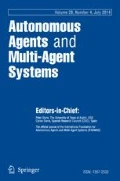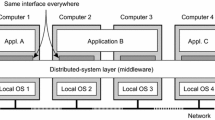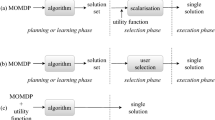Abstract
In this paper, we consider the problem of data allocation in environments of self-motivated servers, where information servers respond to queries from users. New data items arrive frequently and have to be allocated in the distributed system. The servers have no common interests, and each server is concerned with the exact location of each of the data items. There is also no central controller. We suggest using a negotiation framework which takes into account the passage of time during the negotiation process itself. Using this negotiation mechanism, the servers have simple and stable negotiation strategies that result in efficient agreements without delays. We provide heuristics for finding the details of the strategies which depend on the specific settings of the environment and which cannot be provided to the agents in advance. We demonstrate the quality of the heuristics, using simulations. We consider situations characterized by complete, as well as incomplete, information and prove that our methods yield better results than the static allocation policy currently used for data allocation for servers in distributed systems.
Similar content being viewed by others
References
P. M. G. Apers, “Data allocation in distributed database systems,” ACM Transactions on Database Systems, vol. 13, no. 3, pp. 263-304, 1988.
M. Ben-Or and N. Linial, “Collective coin flipping, robust voting games and minima of banzhaf values,” in Proc. 26th IEEE Symposium on the Foundations of Computer Science, Portland, 1985, pp. 408-416.
V. Bhaska, “Breaking the symmetry: Optimal conventions in repeated symmetric games,” in The 17th Arne Ryde Symposium on Focal Points: Coordination, Complexity and Communication in Strategic Contexts, Sweden, 1997.
A. H. Bond and L. Gasser, “An analysis of problems and research in DAI,” in A. H. Bond and L. Gasser (eds.), Readings in Distributed Artificial Intelligence, Morgan Kaufmann Publishers, Inc.: San Mateo, CA, 1988, pp. 3-35.
S. Ceri, G. Martella, and G. Pelagatti, “Optimal file allocation in a computer network: a solution method based on the knapsack problem,” Computer Networks 6, vol. 6, pp. 345-317, 1982.
W. W. Chu, “Optimal file allocation in a multiple computer system,” IEEE Trans. Comput., vol. C-18, pp. 885-889, 1969.
S. E. Conry, “Multistage negotiation for distributed constraint satisfaction,” IEEE Trans. Systems Man and Cybernetics, vol. 21, no. 6, pp. 1462-1477, 1991.
S. E. Conry, R. A. Meyer, and V. R. Lesser, “Multistage negotiation in distributed planning,” in A. H. Bond and L. Gasser (eds.), Readings in Distributed Artificial Intelligence, Morgan Kaufmann Publishers, Inc.: San Mateo, CA, 1988, pp. 367-384.
R. W. Cooper, D. V. DeJong, R. Forsythe, and T. W. Ross, “Selection criteria in coordination games: Some experimental results,” The Amer. Econ. Rev., vol. 80, no. 1, pp. 218-233, 1990.
T. E. Copeland and J. F. Weston, Financial Theory and Corporate Policy, Addison-Wesley Publishing Company, 1992.
K. Decker and V. Lesser, “Analyzing a quantitative coordination relationship,” Group Decision and Negotiation, Special Issue on Distributed AI, 1993.
L. W. Dowdy and D. V. Foster, “Comparative models of the file assignment problem,” Computing Survey, vol. 14, no. 2, pp. 289-313, 1982.
X. Du and F. J. Maryanski, “Data allocation in a dynamically recon.gurable environment,” in Proc. IEEE Fourth Int. Conf. Data Engineering, Los Angeles, 1988, pp. 74-81.
E. H. Durfee, “What your computer really needs to know, you learned in kindergarten,” in Proc. of AAAI-92, California, 1992, pp. 858-864.
E. H. Durfee and Victor R. Lesser, “Negotiating task decomposition and allocation using partial global planning,” in L. Gasser and M. N. Huhns (eds.), Distributed Artificial Intelligence, Volume II, Pitman/Morgan Kaufmann: London, 1989, pp. 229-244.
E. Ephrati and J. S Rosenschein, “Deriving consensus in multiagent systems,” Artificial Intelligence, vol. 87, nos. 1-2, pp. 21-74, 1996.
K. P. Eswaran, “Placement of records in a file and file allocation in a computer network,” in Proc. IFIP Congress on Information Processing, North Holland, 1974, pp. 304-307.
J. Farrell, “Meaning and credibility in cheap-talk games,” Games and Economic Behavior, vol. 5, pp. 514-531, 1993.
S. French, Decision Theory: An Introduction to the Mathematics of Rationality, Ellis Horwood Limited, 1986, pp. 175-182.
D. Frost and R. Dechter, “In search of the best constraint satisfaction search,” in Proc. Twelfth National Conf. Artif. Intell., 1994, pp. 301-306.
D. Fudenberg and J. Tirole, Game Theory, MIT Press: Cambridge, MA, 1991.
M. R. Garey and D. S. Johnson, Computers and Intractability: A Guide to the Theory of NP-Completeness, W. H. Freedman and Company: NY, 1979.
L. Gasser, “Social concepts of knowledge and action: DAI foundations and open systems semantics,” Artificial Intelligence, vol. 47, nos. 1-3, pp. 107-138, 1991.
D. E. Goldberg, Genetic Algorithms in Search Optimization and Machine Learning, Addison-Wesley Publishing Company, 1989.
J. R. Hackman (ed.), Groups that Work (and Those That Don't), Jossey-Bass Publishers: San Francisco, CA, 1991.
H. Haller, “Non-cooperative bargaining of n ≥ 3 players,” Economics Letters, vol. 22, pp. 11-13, 1986.
J. C. Harsanyi and R. Selten, General Theory of Equilibrium Selection in Games, MIT Press: Cambridge, MA, 1988.
F. S. Hillier and G. J. Lieberman, Introduction to Operations Research, McGraw-Hill, 1995.
J. C. Jamison, “Valuable cheap-talk and equilibrium selection,” in The 17th Arne Ryde Symposium on Focal Points: Coordination, Complexity and Communication in Strategic Contexts, Sweden, 1997.
M. Kandori, G. J. Mailath, and R. Rob, “Learning, mutation, and long run equilibria in games,” Econometrica, vol. 61, no. 1, pp. 29-56, 1993.
J. Kennan and R. Wilson, “Bargaining with private information,” J. Economic Literature, vol. XXXI, pp. 45-104, 1993.
T. Khedro and M. Genesereth, “Progressive negotiation for resolving conflicts among distributed heterogeneous cooperating agents,” in Proc. of AAAI94, 1994, pp. 381-386.
S. Kraus, J. Wilkenfeld, and G. Zlotkin, “Multiagent negotiation under time constraints,” Artificial Intelligence, vol. 75, no. 2, pp. 297-345, 1995.
R. D. Luce and H. Raiffa, Games and Decisions, John Wiley and Sons, 1957.
S. T. March and S. Rho, “Allocating data and operations to nodes in distributed database design,” IEEE Transactions on Knowledge and Data Engineering, vol. 7, no. 2, pp. 305-317, 1995.
S. Minton, M. D. Johnston, A. B. Philips, and P. Laird, “Minimizing conflicts: A heuristic repair method for constraint satisfaction and scheduling problems,” Artificial Intelligence, vol. 58, pp. 161-205, 1992.
T. Moehlman, V. Lesser, and B. Buteau, “Decentralized negotiation: An approach to the distributed planning problem,” Group Decision and Negotiation, vol. 2, pp. 161-191, 1992.
B. Moulin and B. Chaib-Draa, “An overview of distributed artificial intelligence,” in G. M. P. O'Hare and N. R. Jennings (eds.), Foundations of Distributed Artificial Intelligence, John Wiley & Sons, Inc.: NY, 1996, pp. 3-55.
T. Mullen and M. Wellman, “A simple computational market for network information services,” in Proc. First Int. Conf. Multiagent Systems, California, 1995, pp. 283-289.
R. Myerson, “Incentive compatibility and the bargaining problem,” Econometrica, vol. 47, no. 1, 1979.
R. Myerson, Game Theory, Harvard University, 1991.
NASA, EOSDIS Home Page. http://www-v0ims.gsfc.nasa.gov/v0ims/index.html.
J. F. Nash, “The bargaining problem,” Econometrica, vol. 18, pp. 155-162, 1950.
J. F. Nash, “Two-person cooperative games,” Econometrica, vol. 21, pp. 128-140, 1953.
M. J. Osborne and A. Rubinstein, Bargaining and Markets, Academic Press Inc.: San Diego, CA, 1990.
M. J. Osborne and A. Rubinstein, A Course in Game Theory, MIT Press: Cambridge, MA, 1994.
Patrick Prosser, “Hybrid algorithms for the constraint satisfaction problem,” Computational Intelligence, vol. 9, pp. 268-299, 1993.
J. S. Rosenschein and G. Zlotkin, Rules of Encounter: Designing Conventions for Automated Negotiation Among Computers, MIT Press: Boston, 1994.
A. Rubinstein, “Perfect equilibrium in a bargaining model,” Econometrica, vol. 50, no. 1, pp. 97-109, 1982.
R. Schwartz, “Negotiation about data allocation in distributed systems,” Master's thesis, Bar-Ilan University, Ramat-Gan, Israel, June 1997.
R. Schwartz and S. Kraus, “Negotiation on data allocation in multi-agent environments,” in Proc. of AAAI-97, Providence, RI, 1997, pp. 29-35.
R. Schwartz and S. Kraus, “Bidding mechanisms for data allocation in multi-agent environments,” in M. P. Singh, A. S. Rao, and M. J. Wooldridge (eds.), Intelligent Agents IV: Agent Theories, Architectures, and Languages, Springer-Verlag, 1998, pp. 61-75.
S. Sen, T. Haynes, and N. Arora, “Satisfying user preferences while negotiating meetings,” Int. J. Human-Computer Studies, vol. 47, no. 3, pp. 407-427, 1997.
Sandip Sen and Edmund H. Durfee, “The role of commitment in cooperative negotiation,” Int. J. Intelligent and Cooperative Information Systems, vol. 3, no. 1, pp. 67-81, 1994.
H. Siegelmann and O. Frieder, “Document allocation in multiprocessor information retrieval systems,” Technical Report IA-92-1, George Mason Univ., March 1992.
C. Sierra, P. Faratin, and N. Jennings, “A service-oriented negotiation model between autonomous agents,” in Proc. 8th European Workshop on Modeling Autonomous Agents in a Multi-Agent World (MAAMAW-97), Ronneby, Sweden, 1997, pp. 17-35.
K. P. Sycara, “Resolving Adversarial Conflicts: An Approach to Integrating Case-Based and Analytic Methods,” Ph.D. thesis, School of Information and Computer Science, Georgia Institute of Technology, 1987.
K. P. Sycara, “Persuasive argumentation in negotiation,” Theory and Decision, vol. 28, pp. 203-242, 1990.
John B. Van Huyck, Raymond, C. Battalio, and Richard O. Beil, “Tacit coordination games, strategic uncertainty, and coordination failure,” The Amer. Econ. Rev., vol. 80, no. 1, pp. 234-248, 1990.
H. M. Weingartner and D. N. Ness, “Methods for the solution of the multi-dimensional 0/1 knapsack problem,” Operations Research, vol. 15, no. 1, pp. 83-103, 1967.
M. Wellman, “A market-oriented programming environment and its application to distributed multicommodity flow problems,” J. Artificial Intelligence Research, vol. 1, pp. 1-23, 1993.
M. J. Wooldridge and N. R. Jennings, “Agent theories, architectures and languages: A survey,” in Intelligent Agents, Lecture Notes in Artificial Intelligence No. 890, Springer-Verlag, 1995, pp. 1-39.
P. Young, “The evolution model of bargaining,” J. Economic Theory, vol. 59, pp. 145-168, 1993.
P. Young, “The evolution of conventions,” Econometrica, vol. 61, no. 1, pp. 57-84, 1993.
D. Zeng and K. Sycara, “Benefits of learning in negotiation,” in Proc. of AAAI-97, Providence, Rhode Island, 1997, pp. 36-41.
G. Zlotkin and J. S. Rosenschein, “Cooperation and conflict resolution via negotiation among autonomous agents in noncooperative domains,” IEEE Trans. Systems Man and Cybernetics, vol. 21, no. 6, pp. 1317-1324, 1991.
Author information
Authors and Affiliations
Rights and permissions
About this article
Cite this article
Azoulay-Schwartz, R., Kraus, S. Negotiation on Data Allocation in Multi-Agent Environments. Autonomous Agents and Multi-Agent Systems 5, 123–172 (2002). https://doi.org/10.1023/A:1014838726454
Issue Date:
DOI: https://doi.org/10.1023/A:1014838726454




